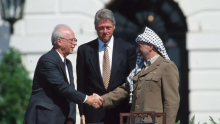30 years since the Oslo Accords: promises betrayed and illusions shattered
Thirty years ago, on 13 September 1993, the so-called Oslo Accord was signed. At the White House, in Washington, PLO Chairman Yasser Arafat and Israeli Prime Minister Yitzak Rabin signed the "Declaration of Principles on Interim Self-Government Arrangements."
The PLO recognised the right to existence and security of the State of Israel. The Palestinians de facto renounced (following on from what they had already done in their declaration of independence in Algiers in 1988) 78 per cent of their historic territory, occupied by Israel, in the hope of seeing a Palestinian state established on the remaining 22 per cent (West Bank, Gaza Strip, East Jerusalem).
Israel, for its part, limited itself to recognising the PLO as the representative of the Palestinian people, without making any commitment to recognising a Palestinian state.
The accord provided for the creation of a Palestinian National Authority, with responsibility for internal administration in the Gaza Strip and West Bank, but in a situation of dependence on Israel, which retained control of the borders.
Fundamental issues—such as the existence of a Palestinian state, Israeli settlements in the territories occupied in 1967, the management of water resources, the return of Palestinian refugees (created by successive waves of ethnic cleansing) or the status of Jerusalem—were left pending future negotiations for a comprehensive accord, which should be finalised within five years.
The 1993 Oslo Accord was complemented by the so-called Oslo II Accord. Signed in Taba (Egypt) in 1995, it created Areas A, B and C in the West Bank, with Areas A and B giving some limited powers and responsibilities to the Palestinian Authority, while Area C, the largest of all, covering 60 per cent of the West Bank territory, remained under full Israeli control. Oslo II was to be an interim agreement, with a view to negotiations on a final agreement based on UN Security Council Resolutions 242 and 338.
Affirmation of US hegemony
The Oslo Accords cannot be understood or evaluated outside of their context: the affirmation of the unipolar hegemony of the United States throughout the world and the concomitant general retreat of the liberation movement.
The very location chosen and the staging of the signing of the 1993 Accord say a lot about its nature: although the negotiations took place thousands of kilometres away, in the Norwegian capital, it was US President Bill Clinton in Washington who hosted the signing ceremony, visibly pleased. As part of the negotiations, the natural forum of the UN—with its collection of resolutions on the Palestinian question—has been diminished and replaced by the false "arbitration" of the hegemonic power, the unrepentant protector (and financier) of the Zionist state.
The Oslo Accords represented a painful compromise in which the Palestinians gave up more than three quarters of their historic territory in exchange for the expectation of creating an independent state in the territories occupied in 1967.
Although initially welcomed with hope by a large part of the population, the Oslo Accord was opposed by large sections of the Palestinian resistance, both left-wing and Islamist, and whether or not they belonged to the PLO (among others, the Popular Front for the Liberation of Palestine, the Democratic Front for the Liberation of Palestine, Hamas, Palestinian Islamic Jihad). The conflicts and divisions that arose then persist to this day.
Betrayals and disappointments
Thirty years on, the Oslo Accords can be summarised in a few words: betrayed promises and shattered illusions.
None of the promises were kept: the negotiations that were supposed to last five years were never concluded; the Palestinian state has not seen the light of day; the military occupation has persisted and worsened; the number of Israeli settlers living in the territories occupied in 1967 has increased; the so-called "separation wall" has been built, in reality one of the instruments and manifestations of anti-Palestinian apartheid; the territory of the West Bank is converted into a series of discontinuous ghettos and cut up by countless roadways reserved for Israelis; the Gaza Strip is isolated from the West Bank and has been transformed into an open-air prison for more than a decade and a half, subjected to repeated military aggression; Israel continues to dispose of Palestine's natural resources at will, particularly water; Palestinian prisoners, who should have been released, continue to overcrowd Israeli jails; murders of Palestinians are at the highest level on record; Palestinian refugees continue to be denied the right of return.
The United States persists in arming and financing the Zionist state, its instrument of domination in the Middle East. The pious votes of Western countries in favour of the two-state solution are in reality a veneer that hides their collusion with the Israeli oppressor and abuser against the oppressed and abused Palestinians.
Thirty years on, what remains of the Oslo Accords seems to be mainly "security coordination" between the Palestinian Authority and Israel.
Thirty years after Oslo, the situation in Palestine is tragic, but not hopeless. The Western powers are in obvious decline, and the international situation, although full of contradictions and dangers, presents prospects that were unforeseen until recently.
Above all, against all odds, the Palestinian people are resisting, holding firm to their identity and yearning for freedom. Successive generations have joined the struggle, and the resistance against the Zionist occupier is not slowing down, but growing.
Until the inevitable victory, the Palestinian people deserve and will be able—in their struggle for a sovereign and independent state, for the release of prisoners, for a solution to the refugee issue (in compliance with the relevant UN resolutions)—to count on the solidarity of all those in the world and in Portugal who love freedom and justice. As always, MPPM will not miss their call.


